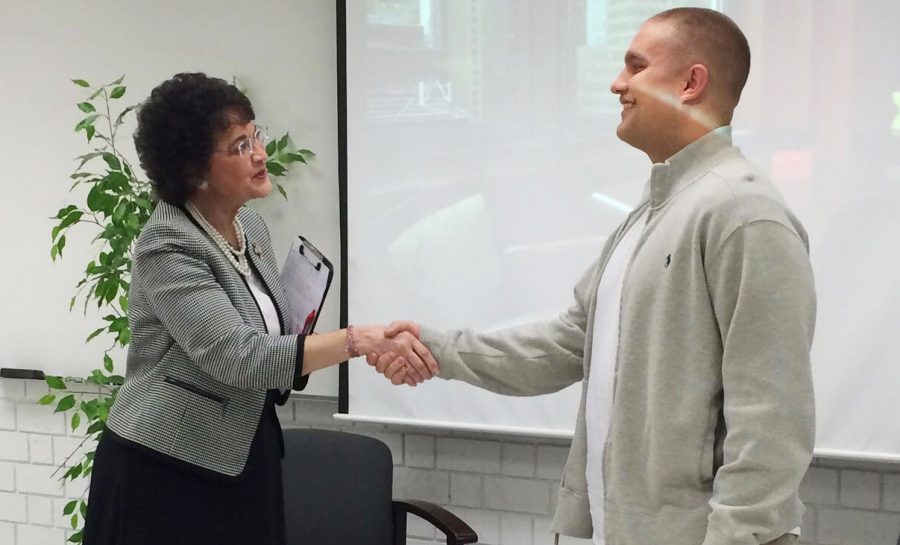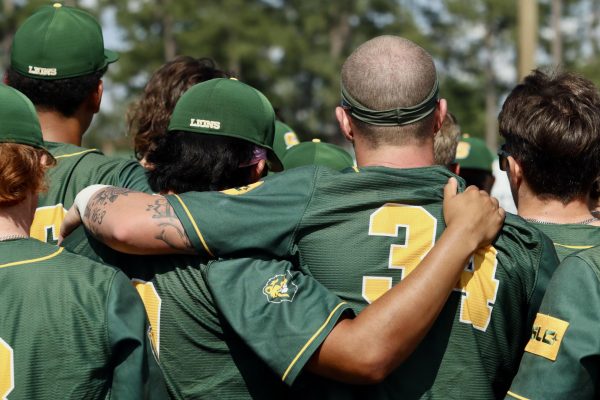The impact of soft skills in the real world
Courtesy of Anna Bass
Anna Bass, an instructor of management and business administration, conducts a mock interview with one of her students. Mock interviews are one of the avenues students can pursue to improve their soft skills in the real world.
Students may overlook the importance of soft skills that are crucial for long-term career success.
Soft skills refer to a combination of skills like communication, self-motivation, teamwork and leadership abilities, which help individuals interact effectively with one another and establish a quality professional presence.
Anna Bass, an instructor of management and business administration, discussed how people’s etiquette and personal attributes correlate with soft skills.
“I believe professional presence involves self-confidence and integrity,” stated Bass. “It involves caring about the well-being of other people and having empathy and trying to put others at ease. You want to make it comfortable for other people and yourself as well.”
While technical expertise is necessary for real-world professions, the need for soft skills can possibly be more essential for the workforce.
According to research with Fortune 500 CEOs by the Stanford Research Institute International, 75% of long-term job success depends on people skills while 25% depends on technical knowledge.
Over time, the importance of soft skills have been recognized.
“Years ago, when management first became a science, people thought all you needed to know how to do was your particular skills in your area,” said Bass. “They regarded professional presence or executive manners as fluff. People are now beginning to realize that it is essential to have that quality professional presence.”
The Office of Career Services offers opportunities to increase students’ awareness and experience with soft skills, including a career and job search planner to make students more marketable for employers.
“With soft skills, one service we offer is mock interviews where the student can schedule an appointment with me to sign up for a mock interview for practice,” explained Kim Readlinger, a career counselor for the Office of Career Services. “Students can meet with me, and I can ask them common questions that employers might ask.”
The OCS defined these soft skills as the eight core skills that promote professionalism. These eight core skills highlight the importance of real-world readiness through critical thinking, problem solving and, oral and written communication.
Kelly McCormick, a sophomore marketing major, shared why she practices incorporating soft skills in her career field.
“I often use soft skills as everyone makes a first impression of you right off the bat,” said McCormick. “Their impression is determined based on your soft skills, and people need to make more use of soft skills in order to be clear and presentable in the workforce.”
In addition, students can familiarize themselves with these underrated core skills through teachers.
“I incorporate my own mock interview in my business communication classes every semester, and I interview every student in front of the class as if they were going for a real job,” shared Bass. “I have spoken in other people’s classes, and no matter what I’m teaching, I always save two class periods to have my students interact with me to learn how to do these certain skills. The more students see teachers’ interests in soft skills, the more students become aware of how important they are.”
Regardless of the career field, having exceptional soft skills prepares students for the real world in order to achieve success.
“I always tell students that your hard and technical skills get your foot in the door, but your soft skills are what opens more doors to come,” expressed Readlinger. “Critical thinking, problem solving, all of those are soft skills that are needed at any job regardless of what major you choose.”
Your donation will support The Lion's Roar student journalists at Southeastern Louisiana University.
In addition, your contribution will allow us to cover our annual website hosting costs.
No gift is too small.






